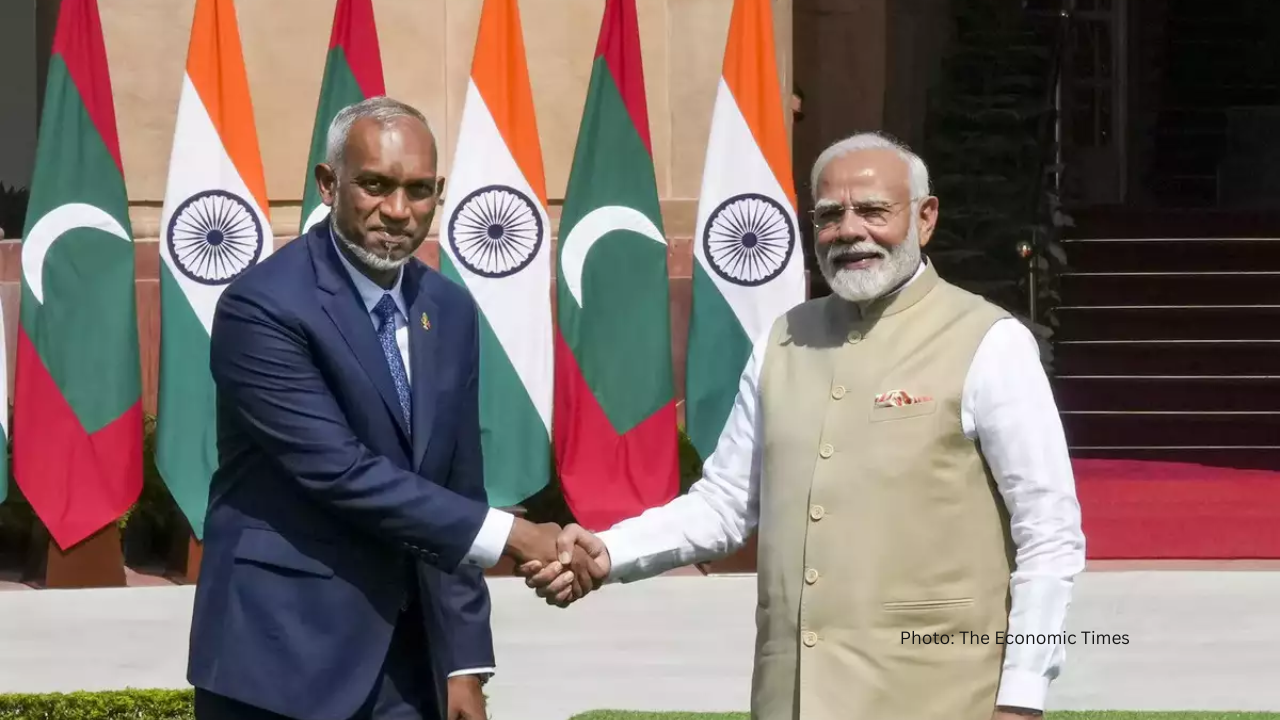A Conspiracy Unfolding India's Ambitions and Maldives' Aspirations for Regional Dominance
Sadia Tasneem | 31 December 2024
Based on an internal document, The Washington Post reported on December 30, 2024, that opposition leaders in the Maldives and agents of India's intelligence agency allegedly conspired to depose President Mohamed Muizzu early last year. Speaking out against the accusations, Ministry of External Affairs (MEA) spokesperson Randhir Jaiswal claimed that the journal and reporter seemed to have a "compulsive hostility" toward India.
In late 2023, President Muizzu threatened to withdraw Indian troops from the Maldives, aiming to secure military aid agreements with Beijing and strengthen relations with China. In January 2024, India's intelligence agency, the Research and Analysis Wing (RAW), began discussing a strategy to replace Muizzu with opposition leaders, which was developed within weeks. Maldivian opposition lawmakers proposed a plan to remove Muizzu from office by bribing 40 members of parliament, including those from his party, along with three criminal groups and ten senior military and police officials. The Washington Post obtained a document titled "Democratic Renewal Initiative," which revealed that the conspirators aimed to secure 87 million Maldivian rufiyaa, or approximately $6 million, from India to finance their efforts.
This situation sheds light on the complex rivalry between China and India over control of this strategically important region in Asia. Although extensive confidential discussions took place, the conspirators ultimately failed to remove Muizzu from office, and India did not support or pursue this effort. Both countries have provided loans, infrastructure projects, and political backing to smaller nations, complicating India’s foreign policy approach amid increasing competition from China. Despite offering support for secular, democratic movements and humanitarian aid in South Asia, India often undermines elected leaders sympathetic to Pakistan and China, contributing to local sentiments of animosity. The Maldives, with a population of 500,000 Muslims, occupies a geographically and politically sensitive position due to its maritime routes.
India has played a significant role in selecting leaders and election candidates from the Maldivian Democratic Party (MDP), raising concerns among Maldivian defense officials as polling analysts and campaign workers traveled from India to assist the party against Muizzu. A senior RAW intelligence official in Washington investigated a plot to overthrow President Muizzu, allegedly involving two Indian intermediaries with economic and political ties to the Maldives: Shirish Thorat, a former police officer, and Savio Rodrigues, a publisher from Goa. Although the Muizzu family adviser provided surveillance recordings of conversations between Thorat and an RAW officer, the means of acquiring those recordings were not disclosed. Thorat and Rodrigues acknowledged their preparations to remove Muizzu but did not clarify if they were acting on behalf of the Indian government.
Intelligence actions are often extensions of foreign policy, with various strategies for achieving success. It remains unclear whether New Delhi authorized the plot or seriously considered supporting the impeachment effort. A Maldives legislator and a RAW intelligence officer expressed skepticism about moving forward with impeachment, citing concerns about potential instability in the already politically volatile Maldives, which is vulnerable to Islamic extremism.
Due to pressing financial realities, Muizzu has had to pragmatically modify his position toward India. He now acknowledges India’s crucial role in stabilizing the Maldivian economy, despite his previous hostility. In response, India has shifted its support for President Muizzu to maintain its influence. The State Bank of India has agreed to postpone $100 million in loan payments for a year, as the Maldives grapples with a substantial debt burden exceeding $8 billion, or 120 percent of its GDP. China and India are the Maldives' two biggest lenders.
According to a statement from India, the two governments have reaffirmed India's role in the Maldives. India will assist the Maldivian military in constructing and managing a naval harbor that had previously sparked protests, open the new Maldivian Ministry of Defense headquarters, and provide ongoing training for the country’s police and military. A politician from Muizzu's party commented that India lacks justification for using secretive tactics to exert pressure on the president. The ongoing political turmoil in the Maldives reflects a deeper issue with India's foreign policy. Although India aims to foster pro-Indian leadership throughout South Asia, its methods often create resentment in the region. Analysts warn that such actions could backfire, increasing opposition movements and alienating the local population. As China and India continue their power struggle, the Maldives finds itself at a complex geopolitical crossroads.
Sadia Tasneem is a Research Associate at CGS
Views in this article are author’s own and do not necessarily reflect CGS policy.
